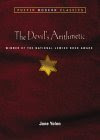The Big War: The Devil's Arithmetic by Jane Yolen
"I'm tired of remembering," Hannah said to her mother as she climbed into the car.
"You know it's Passover," her mother said, sighing in a voice deliberately low. "It's about remembering."
"I remember, I remember,...." Hannah whispered.
Hannah rolled her eyes up and slipped farther down in the sea. Her stomach felt heavy, as if the argument lay there like unleavened bread.
Hannah is tired of hearing the old stories, stories of grandparents, aunts and uncles, cousins, lost to the concentration camps of central Europe in a long-ago war. She's tired of Grandpa Will's tirades about the Nazis and tired of the endless ritual of the Seder. At thirteen Hannah would rather be hanging out with her friend Rosemary, but when her grandpa chooses her to open the apartment door for the prophet Elijah, she reluctantly complies. "Baby stories," she thinks to herself.
Opening the door, Hannah sees before her, not the drab hallway of the building, but a twilight country scene, with a man carrying a hoe over his shoulder and singing as he walks toward her.
Looking back, Hannah finds herself in a house with strangers who call her Chaya and talk about her parents who have just died of cholera in Lublin, Poland. As Hannah tries to understand what is happening to herself, she begins to live the role of Chaya, orphaned and living with her Aunt Gitl and Uncle Shmuel in a rural stetl.
It is only when the family travels with Shmuel to his wedding in a nearby village that Hannah realizes what is happening to her. When the wedding party is taken into custody by uniformed men in old-looking cars, Hannah realizes that the scene is like one from her class's study of the Holocaust. "What year is it?" she frantically asks. "1942" is the answer.
As Chaya, Hannah is forced into a crowded boxcar and "transported" through the gates of a camp under the motto "Arbeiten macht frei." "Work makes freedom." One by one she watches members of her family and friends die of starvation, disease, or as the "chosen" who go through the door of death to the gas chambers. When it is at last her turn to be chosen, as Chaya, she takes the place of a friend and passes through, only to find herself back at her grandfather's doorway, turning from the hallway to a dining room filled with her family and an abundant table.
It's a different Hannah who looks again at her own family, a Hannah who wants to listen to the stories and who wants always to remember.
As Yolen says in her afterword
Fiction cannot recite the numbing numbers, but it can be that witness, that memory. A storyteller can attempt to tell the human tale, can make a galaxy out of the chaos, can point to the fact that some people survived even as most people died. And can remind us that the swallows still sing around the smokestacks.
Labels: 1939-1945, Jews in Poland, World War II Stories (Grades 4-9)



0 Comments:
Post a Comment
<< Home